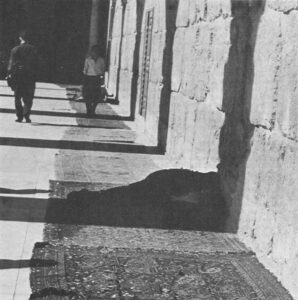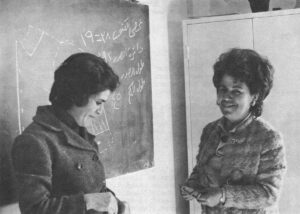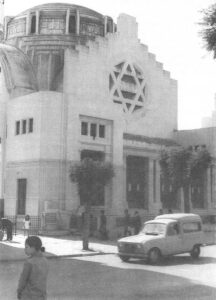March, 1971
*In my first newsletter, my first newsletter for the Alicia Patterson Fund. Uri Avnieri, Member of Knesset (Israel’s Parliament) was interviewed on the subject of Palestine. This newsletter is the second in a series which aims to demonstrate the existence of a plurality of opinion on both sides of the Middle East cease-fire line. The person granting this interview wishes to remain anonymous. Publicly, he identifies himself as a spokesman for Al Hurriah, the organ of the Democratic Pooular front for the Lioeration of Palestine, the farthest left Palestine commando organization.
The tall, dark – and yes – handsome Arab with bushy, black hair and moustache and penetrating brown eyes was dressed entirely in black. He looked mysterious. Yet he – call him Ibrihim – was friendly and open.
Ibrihim was anxious to share his ideas about the Middle East, which he cultivated in his homeland of Lebanon and in his recent studies in England. At a seaside Beirut restaurant, he launched into a three hour long “rap” session for two rapt comrades. He fired off his ideas extemporaneously, but they fell into an outline, organized well enough for a university lecture.
He calls his thinking Marxist-Leninist. “The problem in the Middle East,” Ibrihim announced, “is imperialism, the latest form of which is economic. The United States is the predominant force in the area, so it is her relationship to other countries in the area which determines their politics.”
His analysis “presupposes the rejection of the power struggle between the two superpowers.” Compared to America’s alleged economic imperialism in the Middle East, competition between military, strategic, or political interests of Russia and America is less than irrelevant. Moreover, he downgraded the possibility of any Russian domination in the region. Confronted with figures showing the Egyptian and Syrian balances of trade tipping in Russia’s favor, he replied, “At least her economic domination is well-meaning; it’s friendly.” “The Soviet Union does not exploit economic resources of the Middle East; it provides the Middle East with aid to further development.”
When further challenged on the applicability of his analysis to every problem in the Middle East, Ibrihim readily admitted that of course “not all the problems depend on United States imperialism.” In fact, however, he stuck assiduously to his Marxist-Leninist perspective as he viewed “the whole question of Palestine and what relationship each party concerned has in resolving it.” Some may find his analysis throwing new light on the subject of the Arab-Israeli conflict. Others will reject it. Even in the Arab World where America’s Middle East policy has been almost universally unpopular, his approach is controversial. But strangely enough, it has an audience in Israel among a small group of socialist and non-Zionist Israelis.
Ibrihim’s analysis illustrates that in the Arab World, thinking on Israel is neither monolithic nor static. He himself differentiates four main Arab points of view. He surveys the first three quickly and devotes most of his attention to the fourth group; The Revolutionary Left, with which he identifies.
First are “the pro-imperialist oligarchies – including the regimes of Saudi Arabia, Jordan, Lebanon, and the Arabian Gulf [also known as the Persian Gulf] Emirates.” They have “one common master with Israel; they share with Israel a common allegiance to United States imperialism.” “The existence of Israel has always depended on the reliance on an outside power, with Britain before 1948 (with minor switches), in 1956, and with the United States since 1948.”
“The Arab reactionary regimes – like Israel – are tools of imperialism in the area. Saudi Arabia, Jordan, and Lebanon all send men to be trained with the Special Forces [of the United States] in counter insurgency. In 1958, the United States landed Marines to defend Lebanon.” And in September, 1970, “I have no doubt that as far as the planning and military advice was concerned, the United States was involved” in the Jordanian Civil War. (Ibrihim says he rejects conspiracy theories and feels he is on safer ground than Yasir Arafat, who this fall accused the Americans of taking part in the September fighting in Jordan.)
As long as the reactionary regimes “serve American economic interests and their existence depends on American interest, they stand in relation to Israel totally defeated.” “Since the twenties until today,” continued Ibrihim there are those “who appeal to the West and try to pressure the West to force it to choose between the one hundred million Arabs and Israel.” but says Ibrihim, “no Western power that dominated the area has decided to choose, because the regimes that tried to force the choice were not equal to Britain or the United States, but were rather their local agents.” Their “relationship with America means they are unwilling and incapable of engaging in systematic struggle versus Israel.” For example, “the Lebanese Army has admitted that they refuse to fight the Israeli army; they admitted it after the Israeli raids into Southern Lebanon this January.” Plus these regimes are “doing Dayan’s job much more effectively than Dayan in a showdown with the Palestinian commandos.”
These so-called reactionary regimes may not choose – or dare – to fight Israel and often oppose guerrillas operating in their territories, but that does not mean they are at peace with Israel. And despite their alleged common master, imperialism, the Israeli and the reactionary regimes do not share a common solution to the Middle East crisis. “The Arab reactionary regimes say, ‘There is no imperialism; there is only one enemy; it is Israel.’ The prevailing reactionary analysis on Palestine says Israel is controlling United States imperialism not the United States is controlling Israel [as Iorihim sees it]…. The purpose of this position is to divert attention away from the main enemy, imperialism.”
Ibrihim believes that this reactionary analysis “lends itself to adopting all anti-Semitic theories.” He points out that for this reason, one should carefully distinguish between Israel’s enemies. “It’s not the progressive groups [to which he adheres] but rather King Feisal of Saudi Arabia, who supports imperialism, who wants to throw Israel into the sea.”
Behind that rhetoric, lbrihim reports, “‘the oligarchic regimes know that if they make peace, it would lead to an economic collapse in Jordan and Lebanon.” Ibrihim says that even conservative Lebanese politician Raymond Edde has admitted that “it is not in Lebanon’s economic interest that the Arabs make peace with Israel because Lebanon would then have competition in the fields where Lebanon earns major sums of foreign revenue: offering economic services such as international banking and acting as intermediary link between Western markets and other Arab countries.”
Ibrihim believes that Israel recognizes her economic advantage in a peace settlement with the Arabs. It is one reason why Foreign Minister Abba Eban, “who is known to be closely tied to American economic interests,” called for an economic union with Jordan, Israel, and Lebanon. “Since Israel controls the outlets of the Arab hinterland, then Israel would control such an economic union.” “One component of Zionism is based on economic domination, and behind Eban’s scheme, there is a tendency within Israeli-Zionist views which is apartheid – i.e., domination of white, technologically advanced, capitalist minority over a majority of inhabitants.” Moreover, Israel in peacetime could “import cheap, Arab labor.”
A second major Arab viewpoint concerning Israel is that shared by the “so-called progressive Arab regimes, the United Arab Republic (Egypt) and Syria most importantly. I refuse to call Iraq even so-called progressive,” added Ibrihim to the delight of his comrades. “I call it the regime of I.P.C. [Iraqi Petroleum Company, which provides ninety percent of Iraq’s gross national income].”
“The progressive regime switches its position. At a time of direct conflict, it links imperialism with Israel. At times of cease-fire it tries to separate imperialism from Israel.” And – like the reactionary regimes – it tries to pressure the West to opt in favor of the Arabs. Ibrihim cited the prescription of Mohammad Hassanain Haykal, Nasir’s confidant and Editor of the Cairo daily al Ahram, that Egypt try to “maneuver the bull” – the bull being the West.
“What defines the position of the so-called progressive regimes is their incapacity to really liberate their countries from the new form of imperialism which is economic. It is a question of developing the country and its relationship to the world market, the Western market that is. These regimes as a result of economic imperialism suffer from a contradiction: While leading the struggle against French, English, and American imperialism [in its political, military, or strategic forms], they nevertheless vacillate in their policy against United States [economic] imperialism which has become the predominant force in the area.”
There is a new force in the Arab world constituting a new point of view regarding Israel: The Palestine Liberation Movement, lead by Fateh. “Unlike both the reactionary and so-called progressive regimes, it rejects the Rogers’ Peace Plan. It opposes United States imperialism as the dominant force in the Middle East and opposes the regimes that sustain United States interests.” Further, explains Ibrihim, it demands “self-determination in a secular, democratic Palestine.”
The ideology of the Palestine Liberation Movement often overlaps with that of the Revolutionary Left in the Arab world. But the Palestine Liberation Movement, which has a larger and broader based membership than the Left, is more concerned with Palestine than with radical changes in all parts of the Arab world.
The Revolutionary Left crystallized its position after the June 1967, War. It includes: The Popular Front for the Liberation of Palestine (PFLP) led by Dr. George Habash and best known for its hijackers; The Democratic Popular Front for the Liberation of Palestine (DPFLP) led by Naif Hawatmeh and the farthest left commando organization; The Central Command of the Communist Party in Iraq; The People’s Front for the Liberation of Occupied Arab Gulf which is “waging a five year armed struggle against British imperialism in the Dhofar Province of Oman;” and the Lebanese Left Wing including The Organization of Lebanese Socialists – Socialist Lebanon (It seems that Ibrihim, tongue in cheek – both literally and figuratively – composed the title of this last group on the spot.), which is centered around Al Hurriah, which Ibrihim claims to speak for.
The Revolutionary Left accepts the Marxist-Leninist analysis. And – like the Palestine Liberation Movement – “it rejects both the theory and practice of the reactionary and so-called progressive regimes on Palestine, specifically their acceptance of the Rogers’ Plan.”
“Why did the Revolutionary Left emerge?” Ibrihim asks rhetorically. “It recognized the collapse of nationalist thought that had dominated Arab thinking in the forties and fifties. It emerged because of disillusionment with the Arab Nationalist Movement, which was-led by Syria and Egypt [the so-called progressive regimes]. Not only were they systematically incapable of achieving their three aims: liberty, socialism, and Arab unity. They also crowned their failures with a military defeat in June 1967. As a reaction, there was a visible and rapid shift to Marxism.”
“Another factor in the emergence of the Revolutionary Left was a reassessment of the so-called progressive regimes: “The development of the Baath [Resurrection Party, providing the ideological underpinning of regimes in Syria as well as Iraq] and the Nasserite regime in Egypt produced a new ruling class controlling the economy through the army and governmental bureaucracy. This ruling class rid the country of landed aristocracy and the big bourgeoisie and most forms of imperialism. But it was incapable of solving the problem of underdevelopment.” According to Ibrihim, there are still twelve million landless peasants in Egypt and more than one half the peasant population of Syria is landless. As for industry, most of Egyptian industry, for example, produces consumer goods for the new ruling class of army officers and bureaucrats. (One of Ibrihim’s revolutionary dinner companions chimed in that in Syria, there are shops selling stereos and expensive restaurants catering to this new elite.)
“This type of leadership characterized as representative of the middle classes of the urban Middle East has failed.” According to Ibrihim, the “formula” is now: “The Arab toilers led by the working class constitute the only classes of Arab society which have both the real, consistent interest and means of achieving those aims [of liberty, socialism, and Arab unity].”
The Revolutionary Left is a product of splits within the Arab Nationalist Movement – Nasserites and Baathists – as well as within the Communist Party. At the same time that a “sizable sector within the Baath and Nasserite groups were becoming more radicalized, since 1964 there has been a crosscurrent within the Arab Communist Parties moving out of the Party and moving closer to Nasser and the Baath.” The two crosscurrents – Communists not compromising with Nasserism and Baathism and disenchanted and radicalized Nasserites and Baathists – converged into the Revolutionary Left.
“How to resolve the Palestine problem has been one of the Arab world’s main problems,” says Ibrihim. And it is a major concern of the Revolutionary Left. The five organizations of the new Left, ticked off by Ibrihim, have a new outlook on their Israeli enemy. “The notion of Israel as a spearhead of a Jewish conspiracy and a monolith” has changed to the idea of “Israel as a settler community, which like other societies has its own contradictions.”
Recognizing a plurality of social and political viewpoints within Israeli society, the Revolutionary Left consciously tries to distinguish between Zionist and non-Zionist Israelis. Al Hurriah has translated into Arabic and published several articles written in Hebrew by leaders of Matzpen, a small, non-Zionist, socialist organization in Israel. And the Palestine Research Center in Beirut is publishing a book by Leila Kadi on Matzoen. The Democratic Popular Front for the Liberation of Palestine has issued declarations supporting the non-Zionist Israelis’ position. Matzen and the Revolutionary Left, say Ibrihim, are making “a complementary contribution and are clarifying alternatives. Together they are against Zionism and against reactionary Arab regimes.”
“Matzpen is significant,” explains Ibrihim, “in as much as you have developing an anti-Zionist position in Israel. Their significance is that the majority of the groups are Jews, not Israeli Arabs…. The Israeli Communist Party, Rakah, is a relatively bigger group and it too is anti-Zionist, but it is predominantly Arab. [There is another Communist Party in Israel, Maki, which is predominantly Jewish and – some say – Zionist.] And whereas Rakah accepts peace proposals like the Rogers’ Plan, Matzpen – like the Arab Revolutionary Left – rejects it.” (Rakah follows the traditional, pro-Moscow line in accepting the proposals as well as the November, 1967 United Nations resolution.)
Ibrihim admits that Matzpen is only a fringe group in Israel. And Ibrihim’s Revolutionary Left may be just as marginal in the Arab World; Al Hurriah, which has a circulation of between eight and fifteen thousand, is banned in every Arab country except Lebanon and sometimes South Yemen.
Ibrihim believes, however, that the Left’s ideas are spreading. Fateh, the commando group with “a more representative number of members” opted in favor of the slogan-democratic, secular Palestine – making it no longer an exclusively leftist vision. “What used to be called liberation of Palestine is presently posed not in terms of revenging the humiliation of national pride out in implementing the right of Palestine to self-determination and removing the sting from the Jews there, which is its connection with United States imperialism. Hence the slogan of a democratic secular Palestine.” Their goal is to bring about “the necessary structural changes within the Israeli Jewish community” so that “they will accept to live as equals with Arabs without any nationalism.”
In other ways, Ibrihim claims, revolutionary thinking has trickled down to the masses. “Now you meet young people of Fateh who are really ready to criticize journals for saying ‘Jews did such and such’ when it should read ‘Israeli.’ Some are learning Hebrew. And in letters to the editors in newspapers – not just of progressive journals – you get ordinary people writing letters showing a new mood and saying, ‘We have no problem with Jews.'”
Coupled with this new outlook on Israel, however, is the question of strategy: “How to defeat Israel the enemy.” “If one maintains that it can come about only by internal changes in Israel, then the question of anti-Zionist groups like Matzpen becomes capital…. In as much as this anti-Zionist opposition proves itself, it gives us tools against reactionary zenophobism.”
But according to Ibrihim’s analysis, “The only way of implementing the right of Palestinian people to self-determination is to change the military balance….The anti-Zionists, a vague group, is a secondary, complementary force; the Palestine Liberation Movement is the spearhead…. Emerging from a new interpretation of why the military was defeated in June, 1967, the strategy now is that struggle will be waged by guerrilla warfare rather than by regular armies.”
Ibrihim claims there is “a positive aspect of armed struggle. The guerrillas are discovering what “occupied Palestine [Israel] means; they had to discover that real people live there. Before armed struggle, they relied on the Arab army and never realized that people were actually there. When armed struggle started-it was realized that once you fight a State of Israel, you have to know it. You can’t call it a conspiracy.”
Through armed confrontation, Israelis are simultaneously discovering Palestinians. Ibrihim sees “a new generation Israeli who did not know, pre-Israeli Palestine. He has been subjected to propaganda such as ‘There is no Palestine; the Jews were just trying to free themselves from the British’ and
‘Israel is against one hundred million Arabs… who are trying to complete the work of the Nazis.'”
In 1967 when they become military occupiers, “Israelis were shocked when they saw that there are real Palestinians and that they were ready to fight for Palestine…. People [of Israel] felt they had been cheated; they had been told that Palestinians do not exist, and now the news is covered with Palestine. And they were for the first time in their history facing a severe moral problem – as occupiers and as aggressors; Matzpen, for example, calls its magazine ‘The Israeli imperialist News.'”
“Some people within Zionism realized that Zionism was no outlet for them,” claims Ibrihim. “Before the war, they feared Genocide. After the war, they thought peace was just around the corner once the Arab armies were defeated. Gradually they are realizing that Zionism was just an illusion.”
The Revolutionary Left and Matzpen are speaking the same language – Marxist-Leninist doctrine across the cease-fire line. “I wouldn’t say it is a dialogue. They are just getting together. Most of their leaders are outside Israel.” Many Arab Leftists are also abroad, and that makes meeting easier. There seems to be a mutual understanding; they are contributing to the knowledge that neither side is a monolithic evil incarnate.
Knowledge, however, is often not peacefully applied. Ibrihim’s ideas are no exception.
Received in New York on March 15, 1971.
©1971 Paula Stern
Paula Stern, a free-lance writer, is an Alicia Patterson Fund award winner. This article may be published with credit to Ms. Stern and the Alicia Patterson Fund.










